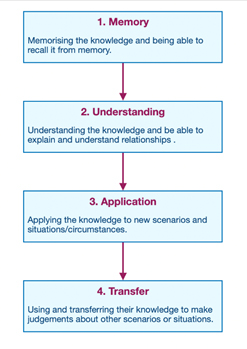During my first five years of teaching retrieval practice has been one of the key strategies that has had the greatest impact on my practice and, as a result, the students’ learning. There are so many benefits of retrieval practice and it now underpins my curriculum throughout KS3, 4 and 5.
There is so much to say about the benefits of retrieval practice and in this first post, I will attempt to summarise these, while also discussing the theory underpinning retrieval practice. I will then go on to look at the use of retrieval practice regularly in the classroom and as a revision tool in two further posts.
The benefits of retrieval broadly fit into three main categories:
- To help transfer knowledge to the long-term memory, and help with schema building;
- To support the working memory and reduce cognitive load;
- As a crucial low-stakes assessment and revision tool.
Long-term memory
Retrieval practice is commonly seen as reviewing or revising what we have learnt and is often not considered to be something that actually contributes to learning. Learning is loosely defined as a change in the long-term memory; it is not the studying of new material or the re-reading of previously learnt material that enables secure learning, but the act of regularly recalling the information. Retrieval practice should be seen as a learning opportunity for both the teacher and the student. The very act of retrieving the information helps it to be further embedded into the students’ long-term memory, and the more often they practise retrieving the information, the easier it will become to remember it. The analogy I use with students is thinking about their memory like a library and their knowledge is stored in their memory as books. The first time they need to find a book, it can be difficult to locate it without clear directions. But each time they try to find that book, it becomes slightly easier to locate it until eventually, they can locate it without even thinking about it. Furthermore, retrieval practice is an excellent way for both the students and the teacher to see where the gaps in knowledge are, helping to target their future revision and inform lesson planning.
Reducing cognitive load
As well as securing learning in the long-term memory, retrieval practice is also critical for activating prior knowledge, reducing students’ cognitive load and enabling students to use their working memory to consciously explore their mental models and link existing ideas, information and concepts to new information. This helps to build their schema (web of knowledge), improving their own understanding and fluency and ability to transfer their knowledge to solve a new problem. It’s important to recognise that retrieval is more than just memorising facts, and that memory is critical in the understanding, application and transfer of knowledge, as seen in the four domains of the learning model below (Karpicke and Grimaldi, 2012).
Examples of low-stakes retrieval activities
Therefore, students should be engaging in some sort of retrieval practice at the start of every lesson, constantly recapping information to strengthen their long-term memory, while also activating prior learning to support the lesson. And, the very act of the students engaging in retrieval practice regularly means that they are spacing out their revision, better preparing them for summative assessment. These retrieval activities need to be planned carefully to ensure maximum gain; they can take a range of forms and can be planned to minimise teacher workload. These activities – tried and tested activities are often the best – can include:
- Quizzes
- Matching up key terms and their definitions
- Multiple-choice questions
- Concept or mind-maps
- Correcting mistakes
- Finding and explaining the odd-one-out
- Making links between key terms.
It is important for these activities to be low-stakes, and for the students to be in control of checking and improving their own work, without necessarily sharing how many answers they got right. This removes any pressure from the students, while also encouraging them to take ownership of their own learning to find their books in the library without having to rely on their teachers to help them out.
In my next post, I will explain in depth some of the retrieval practice strategies I regularly use in the classroom, as well as sharing some student voice on the impact of retrieval practice. I will then outline in my final post how students can use retrieval practice independently to aid revision.
Jenny Campbell is the Subject Leader of Geography in a comprehensive secondary school academy in Coventry. Jenny has a PhD in Physical Geography, specialising in Quaternary climate change, and a Master’s Degree in Teaching Studies, where she developed a student-centred approach to metacognition and retrieval and spaced practice. Jenny is driven to inspire students from all socio-economic backgrounds, regardless of barriers to learning and their starting point, to have an impact on the world in which they live. A lover of teaching & learning, Jenny is a firm believer in research-informed teaching, and she is always looking for innovative improvements to refine her practice.
Find out more about Collins Revision




